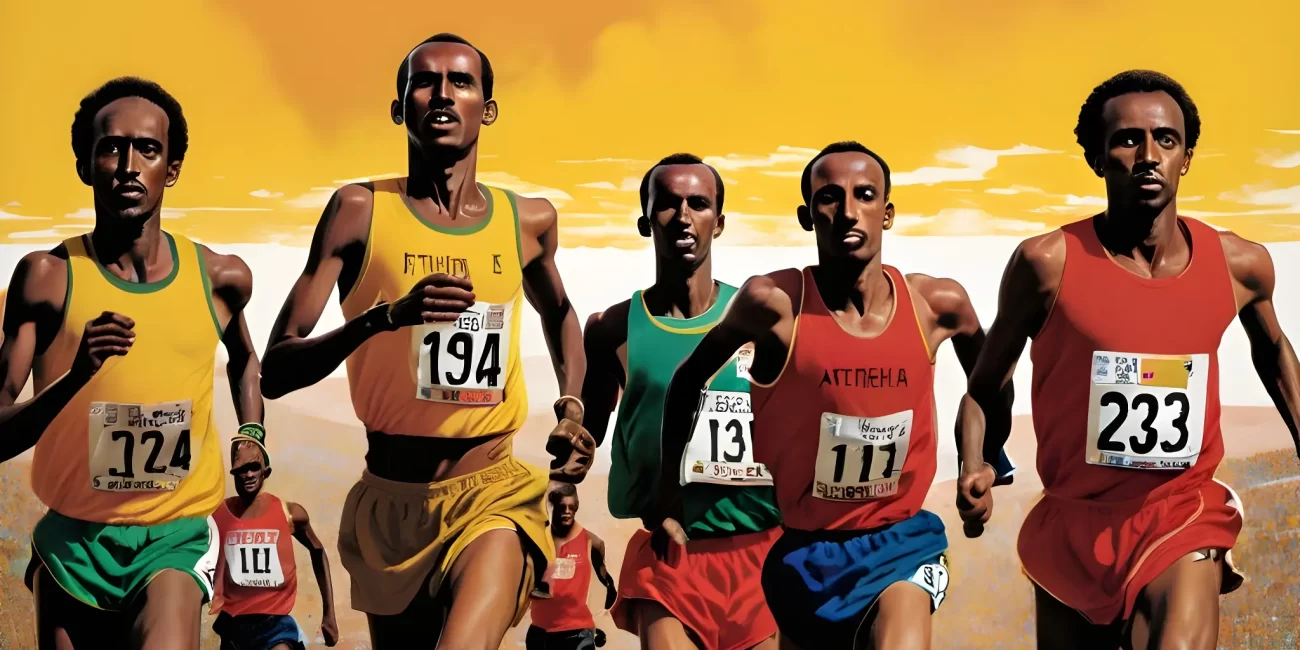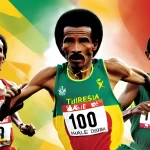The connection between athletics and Ethiopia is a deep-rooted one, stretching back through the ages, positioning the country as one of the premier athletics countries in Africa. Ethiopians hold athletics in high regard, almost matching their passion for football. In terms of popularity, athletics stands as the second most beloved sport in the country, right after football.
Ethiopia has achieved remarkable success in this field, a field rich with history and a source of immense pride for its people. The story of track and field in Ethiopia is not just a narrative; it represents a showcase of talent, determination, and the breaking down of gender barriers and stereotypes.
Early History and Development of Athletics in Ethiopia
The rich cultural heritage and geographic landscape of Ethiopia have been credited with contributing to the country’s distinguished history in athletics. In Ethiopian society, athletics, especially long-distance running, has always held a significant place.
Unique physiology endows Ethiopians with an inherent athletic nature, though it wasn’t until the second half of the twentieth century that Ethiopian athletes started to be recognized internationally. The Rome Olympics in 1960 saw Abebe Bikila make history by winning a marathon race running with bare feet, and becoming the first African to win a gold medal. This victory not only took Ethiopian sports to the global stage but also inspired subsequent generations of athletes within the country.
Since that milestone achieved by Abebe Bikila, Ethiopia has had many great runners on the world stage and has witnessed some memorable moments. Those medals include Olympic gold: 23, Olympia silver: 12 and Olympic bronze: 23 (total=58).
Ethiopian Athletics Federation was established in 1961, just one year after Bikila’s historic golden medal to govern the sport in their country and become a member of World Athletics (WA), which is responsible for global track and field activities.
Origins of Athletics in Ethiopia
The Origins of Athletics in Ethiopia go back to the late nineteenth century with the rise of school and military institutions around 1897. This followed modernization attempts during Emperor Menelik II’s reign, which resulted in the recognition of physical education and sports. Defense agencies played a very important role in maintaining soldiers’ physical fitness and tolerance levels. Also, schools introduced games as part of their curriculum that promoted physical activities and games among young people within the country.
These early steps marked the beginning of organized sports in Ethiopia and led to the growth of athletics as an organized discipline. From small beginnings, Ethiopia’s love for sports, especially athletics, was enhanced leading it all over the world.
Rise to Global Prominence
Bikila’s iconic victory marked the beginning of a significant and fully visible rise of athletics. When we talk about African nations, only Kenya and South Africa have more Olympic medals than Ethiopia.
Ethiopia comes in sixth place as one of the most successful countries at the World Athletics Championships with 104 medals made up of 35 gold medals, 38 silver and 31 bronze. Likewise, Ethiopia is ranked sixth among the top listed countries with many medal victories in the African Championships in Athletics after winning a total of 170 medals.
Their incredible achievements on track and field have put Ethiopian athletes under the spotlight the world over. The legendary exploits of athletes such as Abebe Bikila, Haile Gebrselassie and Kenenisa Bekele have helped to cement Ethiopian domination in long-distance running, thus earning international recognition.
Golden Era of Ethiopian Athletics
In Ethiopia, athletics has experienced significant growth and has produced numerous iconic moments since it first gained prominence in the 1960s. But from the early 1990s until the 2000s stands out as a golden era. During this time, Ethiopian athletes registered amazing achievements globally dominating in events of long distance races and winning multiple Olympic and World Championship titles.
World record-holders Haile Gebrselassie and Kenenisa Bekele, who are still alive, were icons of their time, while Tirunesh Dibaba has now become an icon in her own right. Oh! And by the way, if you have ever wondered what is happening with Ethiopian women in athletics, let me tell you that the girls have done very well too. Read more about the history of Ethiopian female athletes as we discuss it below.
Ethiopia at the Olympics
For every Olympic Games since 1956, the exception being 1976, 1984 and 1988, Ethiopia has been a mainstay. Most of its medals have come in the summer Olympics where Ethiopian long-distance runners have made a name for themselves earning them a total of 58 medals so far. It is worth mentioning that Ethiopia first competed in the Winter Olympics at Turin in 2006 and has taken part only twice, without winning any medal.
The Ethiopian Olympic Committee, established in 1948, gained recognition from the International Olympic Committee (IOC) in 1954, managing Ethiopia’s Olympic participation. Ethiopia’s most triumphant Olympic performance occurred at the 2000 Summer Olympics in Sydney, where it garnered eight medals: four golds, one silver, and three bronzes. Among Ethiopia’s Olympians, Tirunesh Dibaba stands out, securing six medals in total, including three golds and three bronzes.
Greatest Ethiopian Athletes Ever
When we speak of the best Ethiopian sportsmen, lots of names come to mind. However, when we apply filters and narrow them down to the five greatest names in Ethiopian history, this becomes a difficult task due to the many extraordinary athletes. Nevertheless, here are the top five names ever in the country.
First and foremost on the list is Abebe Bikila; he has been without a doubt an undoubted great in Ethiopia when it comes to promoting sports more than any other person or player in history. Other leading male runners include Haile Gebrselassie, who won several world championships and two Olympic gold medals, and two-time Olympic champion Bekele Kenenisa who maintained his world record for 5000m until 2020.
Among them are also two women athletes, Tirunesh Dibaba and Meseret Defar. Meseret Defar has achieved numerous historical milestones, including winning multiple Olympic gold medals and securing four world cross-country championships, among many other titles. Both athletes have made significant marks in history with their exceptional achievements.
History of Ethiopian Women in Athletics
Ethiopian women have also seen an increase in their numbers and have had the opportunity to represent their country. More than just participating, these women have excelled, demonstrating that they are rightful contenders. Similar to their male counterparts, Ethiopian women have proven their potential to be outstanding athletes. Prior to 1980, Ethiopia had no female participants in the Olympics.
Fantaye Sirak and Amsale Woldegibriel were the first two women who represented Ethiopia at the 1980 event. Derartu Tulu from Ethiopia became the first woman from Africa who won the Olympic gold medal by taking part in a 10,000-meter race at Barcelona. The impact of women’s athletics is evident from the fact that Ethiopia has won 12 medals in the last two Summer Olympics, with seven of them being won by women.
Current State of Ethiopian Athletics
Talented athletes like Berihu Aregawi, Selemon Barega, and Worknesh Mesele carry on the legacy of their predecessors, showing Ethiopia’s enduring dominance in track and road events. A total of 27 Ethiopian athletes are set to participate in athletics at the 2024 Summer Olympics in Paris, with 11 men and 16 women representing the country.
Challenges and Opportunities
Ethiopia has always been at the forefront of African athleticism, and this is one nation that can rely on its rich tradition to produce talented athletes year after year. Since Ethiopia first sent athletes to the Olympics in Melbourne in 1956, Ethiopian athletes have stood out on a global scale.
Despite challenges such as limited resources and underdeveloped infrastructure, the outlook for athletics in Ethiopia is very optimistic. Building on the legacy of legends like Abebe Bikila, Haile Gebrselassie, and Tirunesh Dibaba, Ethiopia has the potential to continue its dominance in track and field on the global stage.
What is the historical significance of athletics in Ethiopia?
Athletics, particularly long-distance running, holds significant cultural and historical importance in Ethiopia. It has been a source of national pride and global recognition due to the success of legendary Ethiopian athletes like Abebe Bikila, who won the marathon at the 1960 Rome Olympics barefoot, and Haile Gebrselassie, who set multiple world records. The sport reflects resilience, determination, and the countrys high-altitude advantage that naturally prepares athletes for endurance events.
How has infrastructure development affected athletics in Ethiopia?
Infrastructure development has been crucial in nurturing athletic talent in Ethiopia. Investments in sports facilities, such as stadiums and high-altitude training centers like those in Bekoji and Sululta towns, have provided athletes with better training environments. Improved roads have also facilitated access to competitions and training areas. However, there is still room for improvement compared to facilities available in more developed countries.
References
- “Most Popular Sports in Ethiopia.” Sports Foundation. https://sportsfoundation.org/most-popular-sports-in-ethiopia/. (accessed February 8, 2024).
- “Abebe Bikila.” Olympics. https://olympics.com/en/athletes/abebe-bikila. (accessed February 8, 2024).
- “World Athletics.” WorldAthletics. https://worldathletics.org/. (accessed February 8, 2024).
- “Menelik II.” Britannica. https://www.britannica.com/biography/Menilek-II. (accessed February 8, 2024).
- “Ethiopia Record at the Olympics.” Wikipedia. https://en.wikipedia.org/wiki/Ethiopia_at_the_Olympics#:~:text=Ethiopia%20first%20participated%20at%20the,the%202006%20Games%20in%20Turin.(accessed February 8, 2024).
- “Paris 2024 Summer Olympics.” Olympics. https://olympics.com/en/olympic-games/paris-2024. (accessed February 8, 2024).
- “Haile Gebrselassie.” Olympics. https://olympics.com/en/athletes/haile-gebrselassie. (accessed February 8, 2024).
- “Kenenisa Bekele.” Olympics. https://olympics.com/en/athletes/kenenisa-bekele. (accessed February 8, 2024).
- “Tirunesh Dibaba.” Olympics. https://olympics.com/en/athletes/tirunesh-dibaba. (accessed February 8, 2024).











